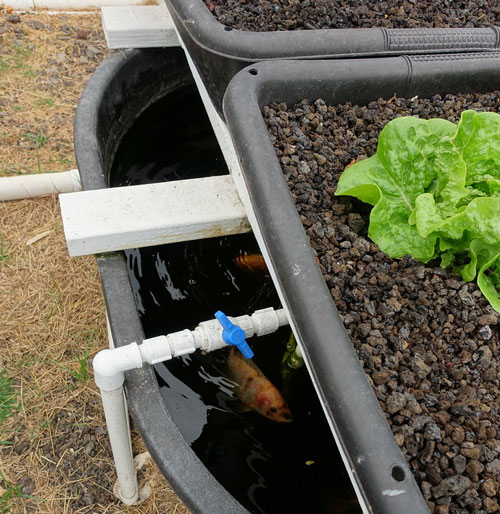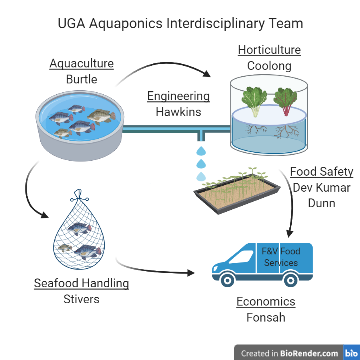Teaming for Interdisciplinary Research Pre-Seed Program
Interdisciplinary Team for Aquaponics

Interdisciplinary Team for Aquaponics

“Aquaponics” by Plant pests and diseases is marked with CC0 1.0
Aquaponic farming integrates traditional aquaculture practices with vegetable production by utilizing fish waste by-product as a nutrient source for water-based horticulture. These systems are particularly critical in food deserts and urban areas, as they can occupy a small physical footprint, they recycle water and nutrients with minimal waste, and they are a year-round food source regardless of season or weather variability. While aquaponic  systems are generally thought to produce vegetables of safe microbiological quality, recent studies have suggested that endemic populations of enteric bacterial pathogens circulate within these closed systems, including Salmonella enterica, Shiga-toxigenic Escherichia coli, Listeria monocytogenes, and Aeromonas hydrophila. If these pathogens contaminate fish or vegetables grown in these systems, outbreaks of foodborne illness are possible, especially in populations that are immunocompromised, elderly, young, or pregnant. This concern has prompted some food safety certifying bodies, including Canada Good Agricultural Practices, to withdraw or phase-out certification for aquaponic farms, thereby limiting market access for aquaponic farms. Research is critically needed to assess and quantify food safety risks associated with aquaponic production, engineer novel mitigation techniques to ensure microbial safety while maximizing fish and vegetable yields, and to create decision-making tools based on economic analyses of these systems to assist new and established producers as they build or update their systems to maximize profitability. The assembled team is well equipped to engage in research related to several facets of aquaponic production, including aquaculture health and management (Burtle), system design and enhancement (Hawkins), seafood (Stivers) and produce (Dunn, Dev Kumar) food safety, horticulture (Coolong), and economic impact (Fonsah). In addition to developing a robust aquaponic research program, six of the seven team members have Extension appointments which will be leveraged to facilitate stakeholder engagement, collaboration, and the dissemination of research findings to support the growing aquaponic industry in Georgia.
systems are generally thought to produce vegetables of safe microbiological quality, recent studies have suggested that endemic populations of enteric bacterial pathogens circulate within these closed systems, including Salmonella enterica, Shiga-toxigenic Escherichia coli, Listeria monocytogenes, and Aeromonas hydrophila. If these pathogens contaminate fish or vegetables grown in these systems, outbreaks of foodborne illness are possible, especially in populations that are immunocompromised, elderly, young, or pregnant. This concern has prompted some food safety certifying bodies, including Canada Good Agricultural Practices, to withdraw or phase-out certification for aquaponic farms, thereby limiting market access for aquaponic farms. Research is critically needed to assess and quantify food safety risks associated with aquaponic production, engineer novel mitigation techniques to ensure microbial safety while maximizing fish and vegetable yields, and to create decision-making tools based on economic analyses of these systems to assist new and established producers as they build or update their systems to maximize profitability. The assembled team is well equipped to engage in research related to several facets of aquaponic production, including aquaculture health and management (Burtle), system design and enhancement (Hawkins), seafood (Stivers) and produce (Dunn, Dev Kumar) food safety, horticulture (Coolong), and economic impact (Fonsah). In addition to developing a robust aquaponic research program, six of the seven team members have Extension appointments which will be leveraged to facilitate stakeholder engagement, collaboration, and the dissemination of research findings to support the growing aquaponic industry in Georgia.
Team Lead
Laurel L. Dunn
Department of Food Science and Technology
laurel.dunn@uga.edu
Team Members
Tori Stivers
Marine Extension and Georgia Sea Grant
Gary Hawkins
Department of Crop and Soil Science
Govindaraj Dev Kumar
Center for Food Safety
Timothy Coolong
Department of Horticulture
Gary J. Burtle
Department of Animal and Dairy Science
Esendugue Greg Fonsah
Department of Agricultural and Applied Economics
